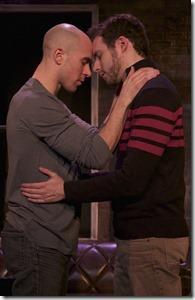
From White Plains
Written by Michael Perlman
i/a/w Craig Wesley Divino, Karl Gregory,
Jimmy King and Aaron Rossini
Directed by Spenser Davis
at Greenhouse Theater, 2257 N. Lincoln (map)
thru Feb 23 | tickets: $15-$25 | more info
Check for half-price tickets
Read review
An insightful look at anti-gay bullying and its aftermath
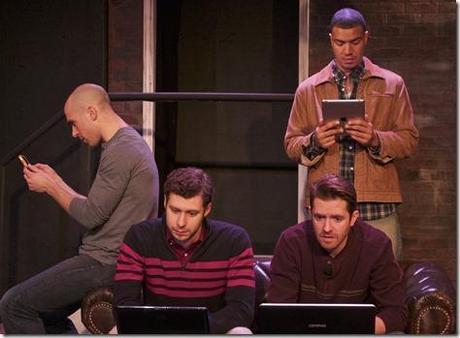
Broken Nose Theatre presents
From White Plains
Review by John Olson
At the Academy Awards of 1994, Tom Hanks inadvertently outed his former high school teacher as gay while accepting his Best Actor Oscar for Philadelphia – an occurrence which inspired the film comedy “In and Out”. Playwright Michael Perlman (who shares the writing credit with his original New York cast of this play) turns this premise around by presenting us with a screenwriter, Dennis (David Weiss), who intentionally outs former classmate Ethan (Adam Soule) as having been a gay bashing bully during their high school years. The bullying was the subject of the screenplay for which Dennis has just won the Oscar and Dennis names Ethan by name in his nationally televised acceptance speech. This outing has occurred just moments before the play opens like a shot with Ethan and his friend John (John Overton Lewis III) reacting to the revelation. The initial shock gives way to a flurry of rings on Ethan’s cell phone as Ethan hopes this revelation of his unsavory behavior some 15 years earlier will soon be forgotten. That’s not to be. Ethan quickly becomes a pariah, the accusations having a negative impact on every aspect of his life, in spite of his efforts to make amends through a public apology posted on YouTube.
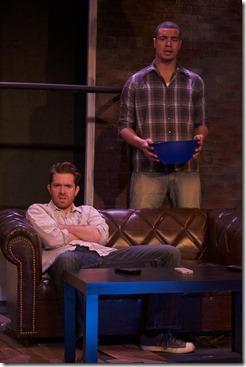
While the conflicts between Dennis and Gregory regarding their differences on public identity and LGBT activism will be familiar to many LGBT audiences (through their own experience as well as exposure to LGBT writing), the depiction of former bully Ethan is what makes this play and this production remarkable. Though Perlman has no ambiguity that Ethan’s bullying left lasting harm (Dennis blames it for a high school friend’s suicide years later), he presents a remarkably nuanced portrait of the adult Ethan, now in his early thirties. He’s clearly changed (though maybe retaining a trace of his homophobia), acknowledges the transgressions and attributes them to his own juvenile insecurity. Perlman’s position toward Ethan’s high school actions is unequivocal, but he lets us see Ethan as a full human being, still flawed but having grown some since high school days and apparently capable of more growth. Director Spenser Davis’s production delivers even further on Perlman’s Ethan through the detailed and convincing portrayal of the character by Soule. Soule keeps us invested in the character – showing us his loutish side but also convincing us he shouldn’t be treated as a war criminal. Davis also tips the scale just a little by casting an African-American as Ethan’s friend John (very nicely underplayed by Lewis). There’s nothing in the script that refers to John’s race, but suggesting that Ethan’s very best buddy is black challenges the easy stereotype of bigots as people afraid of anyone who looks or acts differently from them.
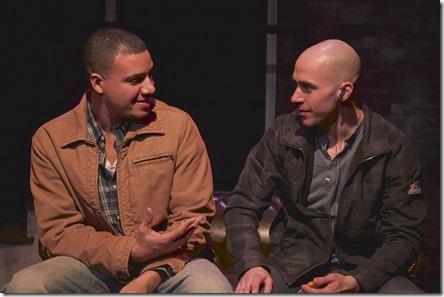
We don’t learn as much about Dennis, though he’s nicely played with the sort of energy and brio one associates with show business people and political activists by Weiss. Dennis seems mostly obsessed with revenge against Ethan and it’s not until the end of the play that Perlman tells us enough to relate to him as a three-dimensional person rather than an archetype. But even if the scenes between Dennis and Gregory (empathetically played by Burke) get polemic, Perlman convincingly makes the valid and important point that in the wake of some many advances in legal and social acceptance of LGBT people, defeating bullying may be the next frontier for activism. Even more effectively, Perlman takes the position that the harm caused by childhood/adolescent bullying can be long-lasting and even fatal, and that’s an argument that has perhaps not been fully explored in the past and deserves full attention. Just as much, though From White Plains is concerned with healing and forgiveness, values that will be essential to keep as society progresses on what appears to be, and we hope will be, its continual shift toward full acceptance of differences in sexual orientation.
Rating: ★★★
From White Plains continues through February 23rd at Greenhouse Theater, 2257 N. Lincoln (map), with performances Thursdays-Saturdays at 7:30pm, Sundays 2:30pm. Tickets are $15-$25, and are available by phone (773-404-7336) or online through Tix.com (check for half-price tickets at Goldstar.com). More information at BrokenNoseTheatre.com. (Running time: 90 minutes, no intermission)
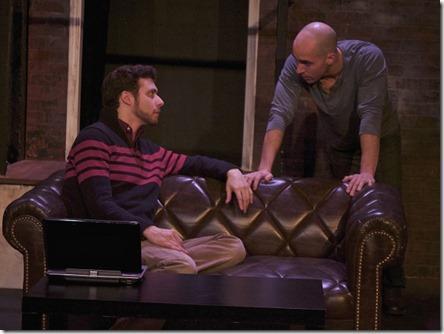
Photos by Charlie Ray Bressler
artists
cast
Ben Burke (Gregory), John Overton Lewis III (John), Adam Soule (Ethan), David Weiss (Dennis)
behind the scenes
Spenser Davis (director, associate producer), Kiley Morgan (stage manager), Tianyu Qui (scenic design),Ivy Reid (lighting design), Rachel S. Parent (costume design), Mitchell Hampton (sound design), Max Lawson (master electrician), Caitlin Boylan (production manager), Conor Clark (technical director), LaNisa Frederick (casting director), Jewel Smith (assistant stage manager), Benjamin Brownson (producer), Elise Spoerlein (associate producer), Charlie Ray Bressler (photos)
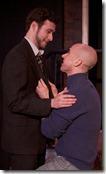
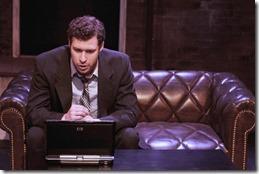
14-0151

